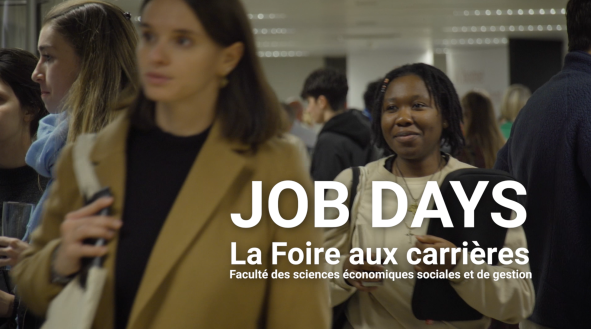Discover the partnerships with companies or organizations maintained by various Faculty disciplines, namely communication, management and economics.
In communication
In information and communication, there are various pedagogical devices that attempt to take into account the expectations of the professional world while maintaining the requirements and objectives of university training. This pedagogy aims to foster employability by meeting expectations, but also how to prepare students of the Bachelor's degree in Information and Communication to act on and within the professional world that awaits them. This difficult balancing act is achieved by opening up the university to the professional world, but also by inviting professionals to take part in student projects and open up to the university themselves.
Concretely, what devices?
- Three professional practice workshops focus on communication writing techniques, audiovisual language and web communication. As part of the Communication Writing workshop, students are asked to solicit professional communicators to respond to an interview.
- Inviting communication and media professionals to certain courses. For example, in the Internship Preparation Seminar, professional communicators, often alumni now in the Communications sector, present their reality of the professional sector and the skills required by interns.
- The internship, in block 3, gives students the opportunity to gain their first professional experience without letting go of the demands of critical reflexivity. A few examples of internship locations:
- In editorial offices, for the orientation of future journalists: press, radio, TV, web, dailies or magazines, local or national press. Examples of collaborations: Boukè Media, Vivacité, RTBF Namur, RTBF Charleroi, RTBF Bruxelles, L'Avenir, NRJ, Canal Zoom , le Journal Des Enfants, RTL Belgium, Matélé, Télésambre, AlluMeuse, Must FM, TELE MB, Le Vif l'express, RTL Belgium SA, MireNA...
- In companies (private or public) or communications agencies, for future communications managers, internal or external communicators, spokespeople, press officers, event organizers... Examples of collaborations: SNCB, FiFF, CHR Sambre et Meuse, Le Forem, PUB, Punch Communication, Inno SA, Otofacto, Hygea Dome Events, Igretec, Maison du Tourisme Explore Meuse, Handicap International, Efluenz, Expansion Partners, Iles de Paix asbl, Materne Confilux, D'ici, Proximus, Hungry Minds, Groupe P&V, Cliniques de l'Europe, NMK Company...
- In cultural organization, production agency for future communications managers with a cuture and audiovisual orientation. Examples of collaborations: Center culturel de Namur , Opéra Royal de Wallonie-Liège, Comité animation citadelle asbl, Beats'n'Roots, Peymey Diffusion, PASTOO ASBL, ASBL GRATTE , Espace muséal d'Andenne, Les Baladins du Miroir, Le Delta, Les Bateliers, Centre culturel Bertix, BIFF...
- The HackaCOM replaces since 2019-2020 the evaluation of internships, as it existed in the form of a multilingual jury since 2013-2014. During a communications marathon, students, divided into teams of all options, produce a communications proposal in response to a real client. In addition to bringing together professionals (internship supervisors attend the presentations), professors and students, this program provides an opportunity to collectively evaluate the enriching and formative internship experience of students in the third year of the Info-Com baccalaureate. Examples of collaborations: Import Plus (Véronique Collard), Your Colors (Carole Mawet), RIEM (Laurence Chassard), Adventure Valley (Luigi Goduti).
- The multidisciplinary project mobilizes the Business Communication and Semiotics courses. Each year, students in the 'Business Communication' course work collectively to mobilize a communication situation in response to a real customer's request. The process is theoretically informed by scientific articles relating to the client's sector and situation. The collaborative process culminates in a final jury, during which the students present the client with a summary of their analyses and communication recommendations. These serve as the starting point for the 'Semiotics' course. In semiotics, students work in sub-groups. They compete like communications agencies responding to a call for tenders. Project design is marked out by three workshops, corresponding to the practical aspects of the three main theoretical approaches covered in the course. Students are asked to design a mock-up (of a poster, a banner, a postcard, etc.) that can then be sent to a graphic designer for production. This multi-disciplinary approach promotes the integration of learning by alternating theoretical input with real immersion in the realities and constraints of an organization. Examples of collaborations: MireNa, Zone de police Namur Capitale, Canopea, Hygea, P&V...
In management
The Faculty's School of Management collaborates with external companies and organizations to enhance students' experiential learning and involve its partners in academic training.
Internships and work-study training
Master of Management Sciences and Management Engineering students are required to complete various internships during their academic training.
- As part of the classic academic track, our students are required to complete a internship of at least 40 working days during their second year of the master's degree
- As part of the academic track in corporate immersion, students enter into collaboration with an organization from the start of master 1 for a period equivalent to three academic quarters, or 15 months. This collaboration is based on the equivalent of 2 to 3 days a week at the company, for a total of around 100 working days over 15 months. It's an opportunity for the company and the student to work together over the long term. This collaboration is unpaid and can cover the full range of management topics.
- Finally, students who choose the Master's degree in digital transformation as a work-study program collaborate for 2 years with an external organization in the exclusive field of digital transformation. This collaboration is spread over 2 years, with 100 days of internship per academic year. The student receives a 'remuneration'.
Operation Carrières
One afternoon, partner organizations are invited to present their management professions. This operation is aimed at all students in the department, both baccalaureate and masters students. The aim is to increase students' familiarity with possible careers after graduation and thus inspire their academic choices in line with their professional preferences.

Recruitment Evening
The Recruitment Evening is aimed specifically at Master's students and is designed to introduce them to internship (for Master 1s) and first-job opportunities. During this evening the department organizes on-campus pre-selection activities for organizations wishing to do so.
Job and internship offers
Throughout the year, the department for relations with external organizations distributes job and internship offers from partner organizations. This dissemination takes place via the electronic student office, which is the most direct communication channel to potential candidates for jobs or internships.
Course involvement
Some partner organizations also have the opportunity to contribute to the academic training of our Master's students via the organization of practical activities or programs to certify the skills of our students.
Contact
Jean-Luc Gustin
Head of Corporate Relations in the Department of Management SciencesIn economics
Through these master's programs co-organized with UCLouvain and via collaborations notably in development cooperation, the economics department offers students the opportunity to carry out an internship in Belgium, Europe and southern countries.
The department is also involved in a number of development cooperation projects with NGOs, public institutions and companies. For example, in Benin, a collaboration with Enabel to carry out action research in support of local policies and players and a collaboration with Colruyt Group for action research for the cashew nut sector have been established. With Iles de Paix, collaboration in research projects has been achieved and members of the department are part of the General Assembly.


